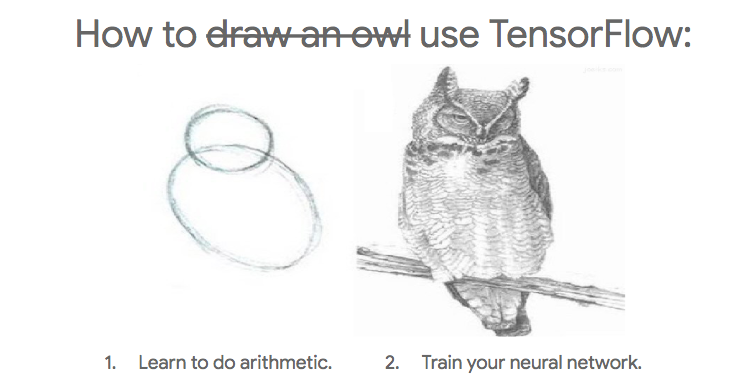[Reposted from my old blog. Read about this new blog]
TensorFlow is a machine learning library from Google. Why it matters?

TensorFlow Logo: pngimage.net
TensorFlow makes learning machine learning much easier. Well, so much so that if one follows the beginning of the official documentation, one can immediately create a highly accurate image recognition. Congratulations!
However, there are so many conditions and 'buts' here. Firstly, the image recognition is either of images of numbers or 'fashion' clothing stuffs, which are all very controlled essentially. The datasets are from TensorFlow itself and thus, quite 'pre-processed' already. So don't jump around the room feeling extremely elated yet, when your console screen shows an accuracy of 91.5% in recognizing the hand-written numbers.
While you may have successfully 'hello world' the life out of machine learning, you will soon fall into a deep learning and realization of sorrow and despair, as you try to entertain the myriad of ideas that just popped into your brain with the potential that this machine learning promises. How the freak do you really train your neural network???
This image from an article in HackerNoon sums it up pretty nicely:

Cassie Kozyrkov: TensorFlow is dead, long live Tensorflow
https://hackernoon.com/tensorflow-is-dead-long-live-tensorflow-49d3e975cf04
Well absolutely. One thing I find from my own learning experience is that knowing the theory HELPS. In fact, it should be the way. While TensorFlow has been a great job in helping to democratize AI and machine learning, the fact is that it is still not as easy as something everyone can do without much effort.
Jumping straight to TensorFlow and its sea of tutorials online? Sure. But knowing (not only a tiny bit/simply know the name) of say, gradient descent surely is a better first start. I do believe this as once we understand the First Principles of anything, then learning the rest such as implementation etc. will not be as problematic anymore.
Nevertheless, for a quick crash course intro into machine learning and particularly deep learning, diving straight to TensorFlow (and its army of tutorials) is very good, especially if you don't have the time to slowly learn and calculate the partial derivatives of functions. Or if you don't have the patience to do so. However, if you plan to go a long way into the fields of application of machine learning and deep learning, those are the things that will make all the difference.
TensorFlow is a machine learning library from Google. Why it matters?

TensorFlow Logo: pngimage.net
TensorFlow makes learning machine learning much easier. Well, so much so that if one follows the beginning of the official documentation, one can immediately create a highly accurate image recognition. Congratulations!
However, there are so many conditions and 'buts' here. Firstly, the image recognition is either of images of numbers or 'fashion' clothing stuffs, which are all very controlled essentially. The datasets are from TensorFlow itself and thus, quite 'pre-processed' already. So don't jump around the room feeling extremely elated yet, when your console screen shows an accuracy of 91.5% in recognizing the hand-written numbers.
While you may have successfully 'hello world' the life out of machine learning, you will soon fall into a deep learning and realization of sorrow and despair, as you try to entertain the myriad of ideas that just popped into your brain with the potential that this machine learning promises. How the freak do you really train your neural network???
The Jump
By following the initial tutorial, assuming we did not really understand the theory or mathematics (linear regression, bayes rule, gradient descent, etc.) behind it, we can still somewhat understand and produce a practical application of the machine learning. However, as I mentioned before, there are just too many controlled variables there, it becomes hard to produce something on our own. Everything is dependent on every black box API that we just simply use.This image from an article in HackerNoon sums it up pretty nicely:

Cassie Kozyrkov: TensorFlow is dead, long live Tensorflow
https://hackernoon.com/tensorflow-is-dead-long-live-tensorflow-49d3e975cf04
Should We Learn it?
Well absolutely. One thing I find from my own learning experience is that knowing the theory HELPS. In fact, it should be the way. While TensorFlow has been a great job in helping to democratize AI and machine learning, the fact is that it is still not as easy as something everyone can do without much effort.
Jumping straight to TensorFlow and its sea of tutorials online? Sure. But knowing (not only a tiny bit/simply know the name) of say, gradient descent surely is a better first start. I do believe this as once we understand the First Principles of anything, then learning the rest such as implementation etc. will not be as problematic anymore.
Nevertheless, for a quick crash course intro into machine learning and particularly deep learning, diving straight to TensorFlow (and its army of tutorials) is very good, especially if you don't have the time to slowly learn and calculate the partial derivatives of functions. Or if you don't have the patience to do so. However, if you plan to go a long way into the fields of application of machine learning and deep learning, those are the things that will make all the difference.

